There was a time when Stephen King didn’t write about ancient evils that threatened the universe. Sure, ‘Salem’s Lot was about a town full of vampires, but it was a small town, and yes, The Shining was about a haunted hotel, but it wasn’t a chain of them. The Stand was a big sprawling book about good and evil that rambled from Maine to Colorado, but it was balanced by Christine about a boy and his car, and Cujo about two families, a dog, and a car. Despite the presence of the Wendigo, Pet Sematary is essentially a domestic novel that takes place in two houses, a patch of woods, and a cemetery.
But at some point King decided to go big. Desperation, The Regulators, and Insomnia are books where King isn’t content to write about anything less than the fate of the universe, and I blame The Dark Tower for super-sizing his fiction.
If you were born in the 70’s or 80’s, a book like The Stand or It or ‘Salem’s Lot was probably your Stephen King gateway drug. But for kids coming of age in the 2000’s, King’s big book is his eight novel Dark Tower series. Originally a limited edition fix-up of some short stories called The Gunslinger, it was first published in 1982 by specialty press, Donald M. Grant. Relatively unknown at first, when King added The Gunslinger to his “Also by” page in Pet Sematary fans and booksellers went nuts, demanding a bigger printing. King reluctantly conceded, allowing bigger and bigger print runs until 1988 when the whole shebang acquired critical mass with the release of a mass market paperback of The Gunslinger, followed by publication of the second book in the series, The Drawing of the Three, seven months later.
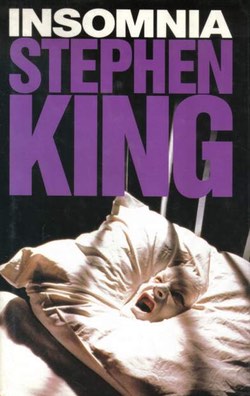 This chunk of the re-read I’m doing covers Insomnia (1994) to From a Buick 8 (2002), and the Dark Tower casts its shadow over almost every single book in this period. King wasn’t just going back to previous titles like It, ‘Salem’s Lot, and The Stand and weaving them retroactively into the Dark Tower mythology, he was also working the Dark Tower mythos into seven of the ten books he wrote in this period (Rose Madder, Bag of Bones, Hearts in Atlantis, Desperation, The Regulators, From a Buick 8, and Insomnia). If you love the Dark Tower, prepare yourself for fan service of the highest order. If you don’t (and I’m not) then prepare yourself for the word ka. A lot.
This chunk of the re-read I’m doing covers Insomnia (1994) to From a Buick 8 (2002), and the Dark Tower casts its shadow over almost every single book in this period. King wasn’t just going back to previous titles like It, ‘Salem’s Lot, and The Stand and weaving them retroactively into the Dark Tower mythology, he was also working the Dark Tower mythos into seven of the ten books he wrote in this period (Rose Madder, Bag of Bones, Hearts in Atlantis, Desperation, The Regulators, From a Buick 8, and Insomnia). If you love the Dark Tower, prepare yourself for fan service of the highest order. If you don’t (and I’m not) then prepare yourself for the word ka. A lot.
Insomnia didn’t have to be a massive book. In fact, it almost wasn’t a book at all. Spurred by a bout of insomnia, King spent a sleepless four months writing it in 1990 before abandoning the project. In an interview with Wallace Stroby for Writer’s Digest in 1991, he said, “It’s a long piece of work, it’s about 550 pages long. It’s no good. It’s not publishable…the last 80 or 90 pages are wonderful. But things just don’t connect, it doesn’t have that novelistic roundness that it should have. And maybe some day you’ll read it, but it won’t be for a long time.”
Actually, it was exactly three years later that King changed his mind and published Insomnia anyways, and the result is…long. After the relatively short and realistic Gerald’s Game (332 pages) and Dolores Claiborne (305), King revived the fictional town of Derry for the first time since It and used it as the setting for this 787-page fantasy story full of proper nouns like Short-Timers, Long-Timers, All-Timers, The Random, The Purpose, The Higher Random, The Higher Purpose, The Crimson King, Deathbags, and The Great Ones (who are a dream dinner party trio consisting of Adolf Hitler, Winston Churchill, and Augustus Caesar).
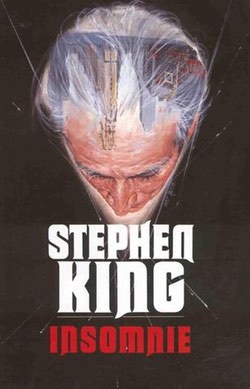 Ralph Roberts is 70 years old and his wife has just died, leaving him with creeping insomnia: every night, he sleeps a little bit less. When he hits full sleeplessness he begins to see his neighbor’s auras. He thinks he’s going crazy, until his 68-year-old lady friend, Lois, reports that she’s seeing them, too. Soon they’re mutually hallucinating three small bald doctors who sneak around carving off chunks of unsuspecting Derryians’s auras. They name the doctors after the fates, and two of them, Clotho and Lachesis, are good while Atropos has gone off the reservation and is killing people at random. Atropos also lives in the roots of an old oak tree, so basically these three guys are the Keebler Elves. Running in parallel is a plot involving Ralph’s mild-mannered neighbor, Ed Deepneau, turning into a wifebeater and obsessing over a pro-choice rally that’s coming to town, headlined by feminist activist Susan Day. As the rally approaches, it turns out that Ed has been recruited by an evil, intergalactic catfish named The Crimson King to fly a plane into the stadium hosting Day, and Clotho and Lachesis recruit Ralph and Lois to stop him. The fate of the universe is, of course, at stake.
Ralph Roberts is 70 years old and his wife has just died, leaving him with creeping insomnia: every night, he sleeps a little bit less. When he hits full sleeplessness he begins to see his neighbor’s auras. He thinks he’s going crazy, until his 68-year-old lady friend, Lois, reports that she’s seeing them, too. Soon they’re mutually hallucinating three small bald doctors who sneak around carving off chunks of unsuspecting Derryians’s auras. They name the doctors after the fates, and two of them, Clotho and Lachesis, are good while Atropos has gone off the reservation and is killing people at random. Atropos also lives in the roots of an old oak tree, so basically these three guys are the Keebler Elves. Running in parallel is a plot involving Ralph’s mild-mannered neighbor, Ed Deepneau, turning into a wifebeater and obsessing over a pro-choice rally that’s coming to town, headlined by feminist activist Susan Day. As the rally approaches, it turns out that Ed has been recruited by an evil, intergalactic catfish named The Crimson King to fly a plane into the stadium hosting Day, and Clotho and Lachesis recruit Ralph and Lois to stop him. The fate of the universe is, of course, at stake.
King’s writing is beyond rebuke at this point in his career, and there are some nice touches throughout Insomnia, from a genuinely moving epilogue to the characterization of the Keebler Elves. Rather than dispensing wisdom, Clotho and Lachesis are pompous and high-strung, given to panic at every moment, sort of like chihuahuas. However, your enjoyment of this book will largely depend on how much tolerance you have for long descriptions of visual hallucinations that seem intended to fill you with wonder but come across like someone describing every single second of their last acid trip in mind-numbing detail:
“Overhead, on the wall-to-wall mural depicting Derry as it had been during its halcyon lumbering days at the turn of the century, dark brown arrow-shapes chased each other, growing closer and closer together until they touched. When that happened they flashed a momentary dark green and changed direction. A bright silver funnel that looked like either a waterspout or a toy cyclone was descending the curved staircase…”
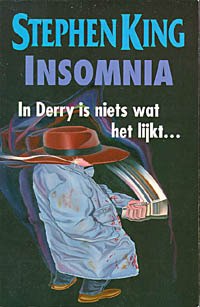 Insomnia is smart about aging, but it also contains a lot of feminist moments that would feel more at home in a more down-to-earth novel. Here, a no-holds-barred debate over abortion rights sits uncomfortably next to sentences like “There’s really that much of this aural energy in the human race?”
Insomnia is smart about aging, but it also contains a lot of feminist moments that would feel more at home in a more down-to-earth novel. Here, a no-holds-barred debate over abortion rights sits uncomfortably next to sentences like “There’s really that much of this aural energy in the human race?”
And then there are the italics. Not only do the Keebler Elves communicate in italics, and not only are italics used for the telepathy that Lois and Ralph increasingly use to talk to each other, but King seems to have lost confidence in his ability to convey what’s important with his writing and instead uses italics to take the reader by the hand and guide him or her to every important word. The result is that you start to feel like the book is shouting at you.
King wrote this book fast, saying that he suffered badly from insomnia during the process, and maybe that accounts for how slapdash it sometimes feels. Whether it’s his clunky profanity (“Fucking booger! Ratdick ringmeat! Suckhole!”) or his terrible dialect (“Dis lady a real princess! I jus hope you know dat!” shouts a wino) or his windy scenes (one conversation between Ralph, Lois, and two of the Keebler Elves runs for 45 pages), Insomnia feels like an enormous first draft sandwiched between a nicely-done prologue and a beautifully written epilogue.
This book also contains a strange bit of synchronicity. At one point, one of the Keebler Elves is trying to explain the workings of some metaphysical hoo-hah to Ralph and says, “When a dog—yes, even a dog, for the destinies of almost all living things in the Short-Time world fall among either the Random or the Purpose—is run over in the road because the driver of the car that hit him picked the wrong moment to glance at his watch…” Less than five years later, Bryan Edwin Smith would pick the wrong moment to glance at his dog, and run over Stephen King in the road, nearly killing him.
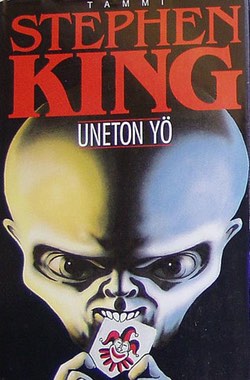 King loved to take long walks alongside Maine’s rural routes, so it’s no coincidence that animals getting run over might have been on his mind. But it’s fascinating that five years before he received five operations in ten days, almost had both legs amputated, and wound up experiencing the worst pain of his life, King wrote Insomnia in which the dispensers of extensive pain and misery are three men he describes as doctors, and that their emotions range from sadism to cold dispassionate regard for human suffering.
King loved to take long walks alongside Maine’s rural routes, so it’s no coincidence that animals getting run over might have been on his mind. But it’s fascinating that five years before he received five operations in ten days, almost had both legs amputated, and wound up experiencing the worst pain of his life, King wrote Insomnia in which the dispensers of extensive pain and misery are three men he describes as doctors, and that their emotions range from sadism to cold dispassionate regard for human suffering.
Viking went out with a first printing of 1.5 million copies of Insomnia when it debuted in September, 1994, and it spent three weeks at number one on the bestseller list, ultimately staying on the list for sixteen weeks. More importantly, to promote the book King set out on his motorcycle to tour independent bookstores across the country. That experience would resurface two books later, forming the spine of one of his better novels of this period, Desperation.
Grady Hendrix has written for publications ranging from Playboy to World Literature Today and his latest novel is Horrorstör, about a haunted Ikea.










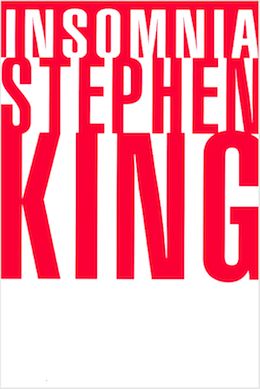
I quit reading SK somewhere about Gerald’s Game and didn’t restart until the Dark Tower brought me back. Eventually I went back and read some of the ones I’d skipped, starting with this one. And this one almost got me to quit again. King kept falling back on stereotypes and stretching out shallow arguments to ridiculous length to make it seem like he was being deep. The connections to the Dark Tower world building seemed strained. Overall it’s not high on my list of favorite King books.
Good description — this one just felt so long.
And now I want a book about a chain of haunted hotels. Too bad Motel 666 is already taken.
It’s interesting how prevalent the feminist movement of the 90’s is in King’s books in this period. Considering my upbringing in a conservative home, these books are pretty much responsible for the fact that I’m a feminist today.
Are you doing Rose Madder? It’s my legit fave, even years before I ever read the DT series and learned how it was connected.
Rose Madder is coming up next week. I’m not sure if that’s a good thing or a bad thing…
I guess I would be in the minority here then when I say that Insomnia might be my favorite King book. I don’t find it long winded, I find it patient. I have always thought that it was building in a slow crescendo to a climax that fit. I agree the epilogue is haunting – meaning it will stay with you for days after. I felt that the descriptions of Ralph’s insomnia and the auras he was starting to see were not overly done, but necessary to show the reader the extent of the world that exists beyond human sight.
My only real gripe is that there are so many loose ends and miscellaneous references in the book – especially the climax. Since it was so obviously connected to IT and the Dark Tower I was expecting some of the extra bits (i.e. “The Green Man”) to show up in later books, but they never really did. The “boy” that was saved only had a very small role to play in the Dark Tower and that was disappointing to say the very least. I can’t help but feel that this was a bit of missed opportunity.
I think I’m that rare person who read and mostly enjoyed this book, despite not being a big fan of the Dark Tower stuff (I’ve not read it all, mostly because what I have read did little to make me want to read more). Regardless, I enjoyed the way this book connected to those other works, all the metaphysical mumbo-jumbo. I mostly skimmed over the long-winded descriptive passages, which certainly helped.
Ultimately, though, I just liked the calm eeriness of it all, the way Ralph’s growing insomnia was depicted and the way it transported him into a whole new world even before he started seeing auras and the doctors. As big and wordy as the book is, there’s also a quietness to it that really sells all the madcap stuff that ultimately happens.
I did enjoy the book too, I read it before reading any of the DT stuff as well.
At age 16, this book put me off King for years. I wasn’t even aware of the Dark Tower when I read it. I started reading him again recently when I picked up a copy of On Writing. From that I read The Long Walk, Different Seasons and Dreamcatcher, and I’m pretty much hooked again.
I love Insomnia. It’s my favorite King book, and the book that really started me as a King fan.
I enjoyed it but it was REALLY out there. I was kind of helped by the fact that I read it, along with a couple other DT-related books, as part of my Dark Tower read-through. The DT books are so weird that it kind of took the edge off. I knew it was connected but I didn’t realize it was going to be THAT tied in with the DT books, I was expecting it was going to be something like Salem’s Lot. In that the story would be stand-alone and this character would just pop up, but it’s all basically a set-up to introduce a DT character. And if I had read it without reading any DT books I think I would have been really confused. On top of probably finding it too weird. As with many King books I enjoyed it more early on when things were more mysterious, but when he explains everything and the plot takes shape on its way to a conclusion things turn more surreal than scary or intriguing. The Little Bald Doctors being the best example. Early in the book when Ralph first starts seeing and encountering them they’re really creepy and mysterious. But as the book goes on you find out they’re just low-level employees who aren’t necessarily that bright, the two “good” ones are kind of wussies and the bad one ends up being more comedic than scary. But even though King’s books tend to do this, they become SO bizarre that I can’t help but enjoy the roller-coaster ride to some extent. And for some reason the most bizarre thing of all in this book was having Connie Chung show up in Derry.
I just finished reading this again, and I haven’t picked it up for years. When I first read Insomnia I loved it, the second reading it was pretty good, now, after the third time I realize that it really is a flawed novel.
First, as King is known to do he over-writes. This book could easily have 200 pages trimmed without losing anything.
Second, the story is jagged; like a bad film edit. Ralph’s friend Bill is presented as a major character in the first third of the book and inexplicably dies halfway through without really doing anything for the story and is brought up as an afterthought in the final act! A painstaking description of Ralph and Lois descending into Atropis’ lair is then shown to only be a 5 minute walk in the park when Ralph needs to get out!
There is a lot of talk about the Random and the Purpose, but this book has no purpose except to be shoe-horned into the Dark Tower universe and by the time you realize it you’ve wasted a lot of your own time reading to what amounts to King trying to amuse himself.